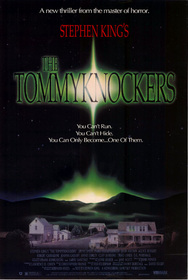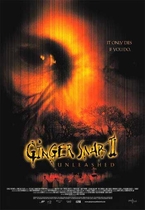Our editor-in-chief Nate Yapp is proud to have contributed to the new book Hidden Horror: A Celebration of 101 Underrated and Overlooked Fright Flicks, edited by Aaron Christensen. Another contributors include Anthony Timpone, B.J. Colangelo, Dave Alexander, Classic-Horror.com's own Robert C. Ring and John W. Bowen. Pick up a copy today from Amazon.com!
The Tommyknockers (1993)
Although I love many of the Stephen King feature films that have been made over the years, there are many things I prefer about King miniseries. For one, any cinematic adaptation of a novel, if we compare the media, is going to necessarily be slimmer in content and characterization, unless we're talking an extremely long film or a very short novel. Occasionally, a film comes along for which that's a benefit -- say, the 1999 filmed version of The Haunting compared to Shirley Jackson's novel The Haunting of Hill House. But King is one of my favorite authors, and I like that most of the miniseries versions of his work have tried to compensate for the literary loss due to compression that the features have unfortunately, but understandably brought about.
The Tommyknockers, based on one of King's less well liked books, achieves a depth of characterization and complexity of plotline more in line with the best King miniseries. Unfortunately, it also suffers from a number of flaws, from blatant continuity errors to extremely cheesy-looking production work, that doesn't mar most of the feature films. The cheesiness is particularly troublesome when you consider that The Tommyknockers had a 12-million dollar budget.
The premise in a nutshell, avoiding spoilers (although my wife, who never read the book, figured out the gist of the whole film within the first 15 minutes), concerns a small cast of characters in an equally small Maine town (of course) who start to experience odd occurrences when one of them, Bobbi Anderson (the sumptuous Marg Helgenberger), runs across an odd object in the "haunted" forest that cradles the town.
The story contains a good portion of the most well known King stereotypes -- there's an alcoholic male, another character is a writer (who is suffering a bout of writer's block, of course), machinery seems to have a mind of its own, innocent objects like toys come to life, there's an ancient, evil secret to the small town, there are philanderers who everyone knows about except for the victimized spouse, etc. This information alone might help you decide whether you're likely to enjoy The Tommyknockers. If you like those aspects of King's work, and accept them as stylistic marks rather than dismiss them as recycled totems, you'll probably find adequate enjoyment in this film, even though you're likely to subtract points for the same reasons that I have.
Due to logistical reasons, or so the producers claimed, The Tommyknockers was lensed primarily in New Zealand. The location scouts did an admirable job of finding a small town to double for New England, but it seems that most of the budget may have been squandered in shipping the production halfway around the world (in addition to the cast's salaries).
Even some pullback shots of the town, which are realized with a fifteen-foot square model, look a bit cheesy. Not as bad as the "aerial" shots of Mister Rogers' neighborhood, maybe, but not that far from it, either.
But there are only a couple of those shots, and they're not very crucial to the film. On the other hand, the "eerie" lighting that is the crux of much of the film until the last reel is integral to the film, and it only works insofar as the cast, also featuring Jimmy Smits, E. G. Marshall, Robert Carradine, Joanna Cassidy, Cliff De Young, and Traci Lords, delivers on-target performances that work in spite of the 70's low-budget styled effect.
The worst offenders are the effects in The Tommyknockers' finale, which features creatures that look like rejects from a more well-respected late 70's film (which I can't name lest I reveal a spoiler) and an extremely choppy, and almost inexcusably gleeful (compared to the novel) ending.
It's not that none of the unusual stuff works -- the revelation in the shed, for instance, is well done, as is the setting of the finale and director John Power's handling of the slow (so slow, it takes up most of the film) "reveal" in the forest--but the extent to which The Tommyknockers succeeds, and it does slightly, is solely dependent on the strength of King's story, Lawrence D. Cohen's largely passable teleplay, the performances, and Power's passable direction.
The Tommyknockers is as interesting in its subtexts and King-isms as it is on any more obvious level. The effects of "the Tommyknockers" on the citizens of Haven (or Haven Falls; the film isn't consistent about the proper name) work as both a parallel to addiction and a metaphor for aging, both of which contain much deep-seated fear for most of us. Unfortunately, you have to dig a bit for either subtext to make much of a statement, and this is one King film that would have probably worked better with a mega-budget on a big screen.









I think the miniseries lost
I think the miniseries lost focus, as well as there were too many weird things happening but no one was asking any questions about.